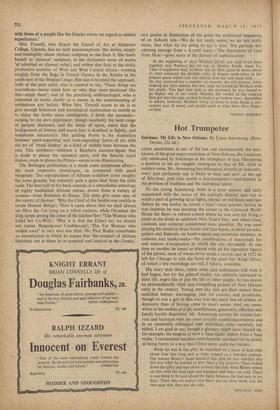Hot Trumpeter
Satehmo: My Life in New Orleans. By Louis Armstrong. (Peter Davies, 12s. 6d.) LOUIS ARMSTRONG is on of the last and incomparably the best- known of the great negro musicians of New Orleans, the Louisiana city celebrated by historians as the birthplace of jazz. Occupying a position in his art roughly analogous to that of Mr. Eliot in modern verse, Mr. Armstrong has influenced, directly or indirectly, every jazz performer one is likely to hear and now, at the age of fifty-four, puts into words a hot-trumpeter's contribution to the problem of tradition and the individual talent..
To the young Armstrong. born in a poor quarter and early acquainted with the mores of the red-light district, jazz was as much a part of growing up as fights, 'physic' or red beans and rice. Before he was twelve he joined a boys' vocal quartet: before he was fourteen he was learning the cornet in the Coloured Waifs' Home for Boys—a reform school where he was sent for firing a pistol in the street to celebfate New Year's Day, and where food, kindness and corporal punishment were plentiful. He was soon playing his cornet in brass bands and jazz bands, at street parades, picnics and funerals, on band-wagons and excursion steamers, in cabarets and honky-tonks—the combinations of dance-hall, bar and maison d'assignation in which the city abounded. At one time or another he heard or played with all the legendary figures of the period, most of whom never made a record, and in 1922 he left for Chicago to join the band of the great .Joe 'King' Oliver. of which a few recordings are still, I believe, available.
His story ends there, where some jazz enthusiasts will wish it had begun, but for the geheral reader, for anybody interested in slum life, negro life or just the life of other people, he has drawn an extraordinarily vivid and compelling picture of New Orleans early in the century. Young men like him got their money from unskilled labour, scavenging, jazz (of course), and prostitutes, though to run a girl in this way was the mark less of avarice or depravity than of having come to man's estate. And yet, some- where in the middle of it all, unselfishness, generosity, affection and family loyalty flourished. Mr. Armstrong records his various hor- rors and humours with the most amiable unselfconsciousness and in an admirably colloquial and individual style—certainly not edited, I am glad to say, though a glossary might have cleared up, for example, the enigma of how a 'bass fiddle' differs from a 'bass violin.' I recommend Satchmo most heartily, not least for its power of being funny in a way that I have never quite met before :
While he was in the alley he stumbled on a piece of lead pipe
about four feet long and as wide around as a bologna sausage. The minute Benny's hand touched this pipe he was satisfied that this was what he needed to give Nico a big surprise. Nico rushed down the alley and was about to enter the tonk when Benny swung on him with the lead pipe and knocked Old Nico out cold. There is one thing to be said about the fights between the bad men in my days. There was no malice and there was no dirty work. Let the best man win, that was the rule.










































 Previous page
Previous page